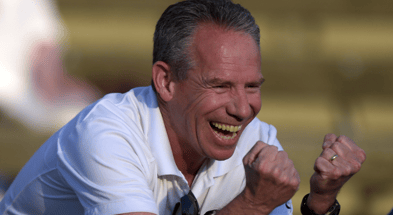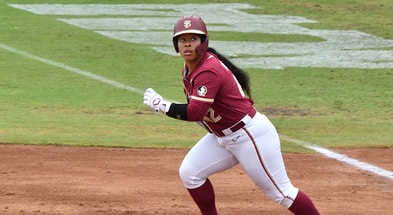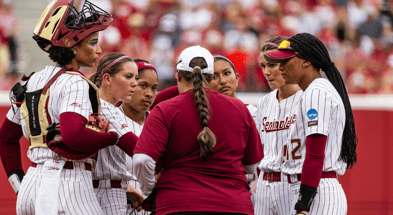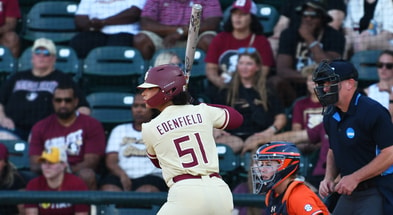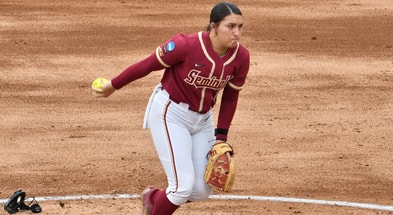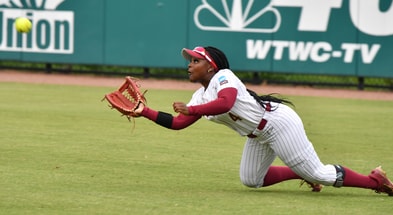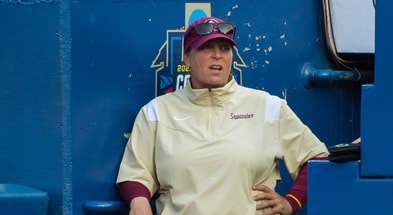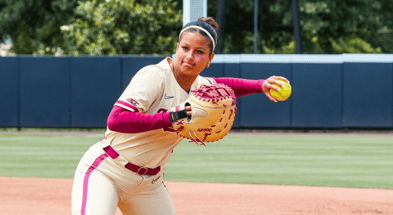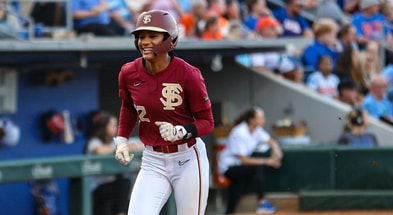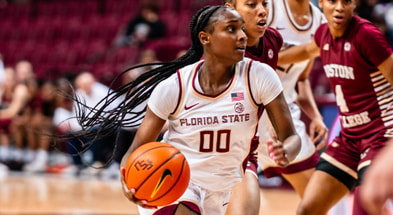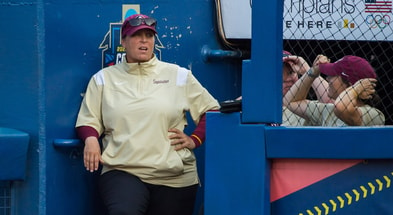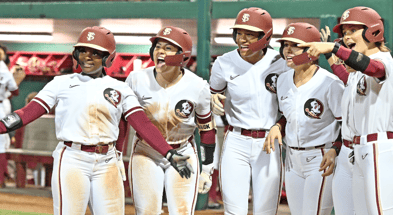After improbable journey, Travis Wilson helps lift FSU Softball to new heights
Thirteen years later, Travis Wilson still sounds surprised Lonni Alameda offered him a job on her Florida State staff.
At the time, he had zero college softball coaching experience. He didn’t have a college degree. He had never coached women.
Other than that, he must have seemed like the ideal candidate.
It was the summer of 2011, and Wilson was giving baseball lessons in Chattanooga, Tenn. His minor-league career had flamed out a few years earlier.
Wilson had an interest in coaching softball because it was the sport he had grown up on back home in New Zealand, but he had never attended college and knew that would likely prevent him from being hired by a university in the United States.
So he wasn’t exactly brimming with confidence when he sent Alameda an email after a mutual friend explained that the young Florida State coach had an opening on her staff.
Alameda sent Wilson a reply the very next day.
“Two weeks later, I was a Florida State Seminole assistant softball coach,” Wilson remembered with a smile. “I don’t know if that’s because I was exactly what she was looking for, or she was that desperate. One of those two things.”
As unorthodox as Wilson’s hiring might have been, it actually aligns perfectly with the rest of his improbable journey. It also will go down as one of the most important decisions along Alameda’s path to building Florida State Softball into a national power.
When No. 15 FSU squares off tonight against No. 2 Oklahoma in the Norman, Okla., Super Regional (7 p.m. ET, ESPN), it will be the Seminoles’ 10th trip to the NCAA Supers since Wilson joined Alameda’s staff. They have only failed to make it that far twice.
And if Florida State can pull off the upset against the three-time defending national champions, the ‘Noles would advance to their sixth Women’s College World Series during that stretch. It would be their third trip in the last four years.
While FSU is a significant underdog against the Sooners, due in large part to an injury-plagued pitching staff, Wilson certainly knows a thing or two about succeeding when the odds are stacked against him.
While growing up in his native New Zealand, Wilson dabbled in cricket as a youth but really found his calling in fast-pitch men’s softball. After picking up the sport at age 9, he started playing in men’s leagues with his father by the time he was 14. He made the national team at 16.
And while helping lead the New Zealand squad to a world championship in 1996 — during a nine-day tournament that was played in Michigan and featured 22 countries — Wilson played so well that he caught the attention of Major League Baseball scouts.
Soon, he would be taking part in a tryout in front of MLB scouts in Australia. And within days, the 19-year-old Wilson had signed with the Atlanta Braves.
“I then came over to the U.S. and played my first ever baseball game in spring training with the Atlanta Braves. You want to talk about eye-opening?” he said with a laugh. “Go halfway around the world, play a sport you’ve never played before. But it was always something I wanted to do. I’d always dreamed of getting the opportunity.”
Though his natural talent was evident, Wilson admits making the switch from fast-pitch softball to professional baseball was a monumental task.
“I was not very good to start off,” he said, adding that he was intimidated by all of the other young prospects who had been playing competitive baseball practically their entire lives. “I went from being pretty good at what I was doing to being like, ‘Holy cow, what have I done?'”
Wilson hit just .215 in rookie ball during the 1997 season, but he began showing real promise over the next few years. While moving up through the Class A and High-A leagues, Wilson hit over .300 with double-digit home runs in the ’98, ’99 and 2000 seasons.
Playing alongside emerging young superstars like Andruw Jones and Rafael Furcal, Wilson performed so well in 2001 spring training that he thought he might actually get an invite to join the big-league club. That call didn’t come, but Wilson improved so much that he spent most of the next three years in Triple-A Richmond. While there in 2002, he belted 13 home runs and drove in 71 runs.
Two years later, however, Wilson played his eighth and final season of professional baseball.
Instead of toiling in the minor leagues for a few more years, the then-27-year-old decided to move on to the next stage of his life. The only problem was he didn’t exactly know what that might entail.
He did some work with the New Zealand Cricket Association. He “bounced around” between teaching baseball and softball. In his heart, Wilson felt strongly that coaching college softball would be the perfect fit, but until Alameda decided to give him a chance, he worried that his lack of a college degree would make that dream impossible.
“The game came to me really easily. I had tools that just matched up really well for the game of softball,” Wilson said. “And I was around some of the greatest men’s softball players ever. So I was forced to grow up quickly, and I was forced to learn the game quickly.
“So I think when I look back, I was getting ready for a coaching career as I was playing. Just because I was so young and being forced to think ahead of my age.”
Wilson’s transition to college coaching was not seamless. He admits he didn’t realize at the time that about 80 percent of the work takes place away from the field and batting cages.
He credits Alameda with teaching him the ropes when it comes to organization and planning, recruiting at an elite level, and developing relationships with donors and supporters. And while he might have been slightly nervous about coaching young women for the first time, Wilson quickly learned that would be the least of his worries.
“The females are just as into it and work just as hard and play just as hard as the guys,” Wilson said. “It didn’t take me long to figure that out. I just had to show to them that I cared about them and I wanted the best for them. And once they knew you were all in for them, man, I don’t know if I’ll coach guys again.”
Wilson has clearly helped the Seminoles reach new heights on the field.
Since he joined the staff before the 2012 season, Florida State is averaging over 52 wins per year. And his hitting and defensive expertise has proven to be a perfect complement to Alameda, who is considered one of the best pitching coaches in the sport.
“Lonni’s been obviously fantastic with the pitching,” Wilson said. “We’ve been a pitching school for a long, long time. We just needed the offense to match it up. I think we’re there now.”
SIGN UP: Join Warchant’s FSU Community for $1 today
Heading into this Super Regional at Oklahoma, Florida State boasts one of the nation’s very best offenses. The Seminoles rank No. 8 nationally in batting average (.336) and No. 7 in home runs (87). They also rank sixth in the country in scoring (7.52 runs per game), slugging percentage (.581) and on-base percentage (.421).
While he and fellow assistant coaches Troy Cameron and Kaleigh Rafter deserve much of the credit for that success, Wilson acknowledges that Florida State’s ability to recruit elite talent is perhaps the most important ingredient.
Back in those early days, the challenge was selling prospects on the vision of what FSU Softball could become. Now, having produced more than a decade of elite-level success — including winning the 2018 national championship — top recruits are selling themselves to the Seminoles.
Two of FSU’s top hitters this season are true freshmen — Jaysoni Beachum (.425, 15 HRs, 65 RBI) and Isa Torres (.360, 9 HRs, 57 RBIs) — and classmate Ashtyn Danley has the best ERA (3.12) in the circle. That trio was part of a signing class that was among the best in the country and perhaps the best in Alameda’s tenure.
Not surprisingly, Florida State has another elite class coming in behind them.
And even though the Seminoles will be forced to replace a slew of senior stars from this year’s team, the program has never been on stronger footing. Alameda has assembled an excellent coaching staff and an expanded support staff, and she has shown her commitment to Florida State by rebuffing a number of attractive job offers from other national powers.
“Big schools with a lot of money coming after her,” Wilson said. “She stayed loyal to Florida State, and I’m glad she did. Tallahassee is a wonderful place. My family is very well-rooted in Tallahassee now with schools, travel ball and all that type of thing. Would we have liked to have moved? Probably not. But if she had gone, we would have gone no question. Thankfully, I think those days are over.
“She’s at a point now where Florida State has made her one of the biggest and well-paid coaches in the game that we don’t have to worry about those right now. So that’s good.”
Another load was lifted off Wilson’s shoulders last summer.
Shortly after Florida State won that national championship in 2018, FSU’s administration encouraged him to finally get to work on earning his college degree. It was part of the agreement to let him come on board seven years earlier.
So more than two decades after he finished high school in New Zealand, Wilson started taking freshman-level classes at Tallahassee Community College.
It was one of the most challenging experiences of his life.
He would drop off his kids at school each morning, work on his college coursework for a couple hours, and then get back to coaching. It made for countless long days and nights. But after a few years at TCC, he was able to enroll at Florida State, and he earned his bachelor’s degree last August.
“It’s one of the things I’m most proud of,” Wilson said. “To be able to go back as a 40-year-old, start fresh and finish my degree. I’m glad I did it. But I also am glad it’s over (laughing).”
So much good has happened during Wilson’s 13 years in Tallahassee.
The Seminoles have become a perennial national power on the field. He has enjoyed perhaps even greater sustained success as a coach than he did as a player — and that’s saying something. He is a college graduate. His family has established real roots in the community.
And he has become an integral part of a Florida State softball family that produces wins on the field and yields lifetime relationships off of it.
Virtually everywhere the Seminoles play, former players are seen in the stands, cheering on their program. It was the case last weekend as Florida State was winning another NCAA Regional, and it will be the same the next few days in Norman, Okla.
Travis Wilson didn’t exactly know what he was getting into when Alameda offered him that job back in 2011. She might not have been exactly sure, either.
It’s difficult to imagine it could have gone any better.
“You get to go to their weddings, you get to see them with their kids, they come back for camps,” Wilson said of the Seminoles’ former players. “We’re very lucky in that regard. That our players, at the end of their careers, go, ‘Holy cow. I got a lot out of Florida State. I got a lot out of Florida State Softball. And I’m just gonna keep showing back up because of that.'”
Talk about this story with other die-hard Florida State football fans on the Tribal Council.
